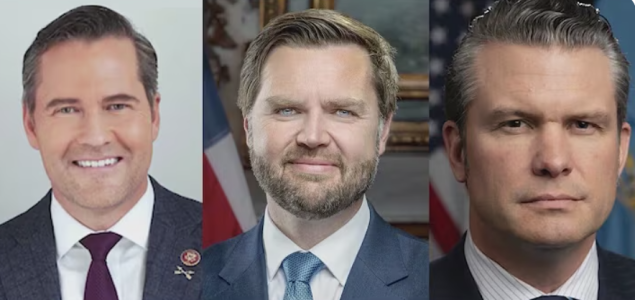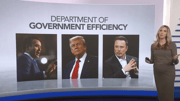Government officials thought their data was secure until it wasn’t—are you safe?
By
Veronica E.
- Replies 0
In today’s world, our personal information is more exposed than ever.
Whether it’s through online accounts, social media, or apps we use daily, our data is constantly at risk of falling into the wrong hands.
A recent high-profile security breach involving top government officials has shed light on just how vulnerable even the most secure individuals can be.
If those in power aren’t safe, what does that mean for the rest of Americans?
The incident began with a private group chat gone wrong.
A messaging app discussion among high-ranking officials, including National Security Adviser Mike Waltz, Director of National Intelligence Tulsi Gabbard, and Secretary of Defense Pete Hegseth, took an unexpected turn when a journalist was mistakenly added.
What followed was a wave of scrutiny that led to the exposure of their private information.

Reports soon revealed that these officials’ personal phone numbers, email addresses, and even some passwords were readily available online.
This wasn’t just an obscure data leak hidden in the depths of the internet.
These details were actively being used, linked to social media accounts, cloud storage, and even fitness apps.
Some of the most alarming findings included:
This situation highlights a disturbing reality—our personal information isn’t just at risk from hackers but also from commercial databases.
A publication reported that these phone numbers and email addresses were linked to social media profiles, Dropbox accounts, and fitness-tracking apps. Some were also tied to active WhatsApp and Signal accounts (messaging applications).
Most of this information was easily accessible online due to past data leaks.
Commercial databases, often used by sales and marketing firms, quickly provided Hegseth and Waltz’s email addresses and phone numbers.

Shockingly, Hegseth’s data appeared on 20 publicly accessible leak servers, including his email and an associated password. While the email was recently active, the publication did not test the password.
Similarly, they uncovered several of Waltz’s passwords, along with his messaging and social media profiles.
WIRED also found Waltz’s unsecured Venmo account, exposing his 328 connections, including Trump’s chief of staff Susie Wiles and media personalities from Fox and CNN.
Security experts were most concerned about his lower-profile contacts—doctors, real estate agents, and a tailor—who could be “soft targets” for counterintelligence efforts, unknowingly revealing sensitive patterns or relationships.
Gabbard’s email was harder to find but appeared on social media. A publicly available phone number was linked to active WhatsApp and Signal accounts.
Cybersecurity experts warn that breaches like this can have severe consequences.
Former intelligence analyst Michael Ard told WIRED the counterintelligence risks and security flaws were alarming.
Cybersecurity expert Donald Ortmann warned that leaked data from top politicians could help hackers craft phishing attacks to access emails, chat apps, and financial accounts.
Gabbard and CIA Director John Ratcliffe faced intense criticism in Congress over the Signal mishap.
During a heated hearing, Congressman Jim Himes warned that only luck had prevented a disaster.
This incident serves as a wake-up call. While we may not be government officials, our personal information still holds value and should be safeguarded. Here are a few steps you can take today:
This breach is a wake-up call—if top officials can fall victim to cyber threats, so can anyone. Taking simple steps to secure your online presence can make a huge difference in protecting your personal information.
Read next: Breaking: The CDC is investigating this vaccine—are you at risk after recent hospitalizations?

At The GrayVine, we believe in keeping our community informed and protected. What steps have you taken to secure your digital presence? Share your thoughts and tips in the comments below!
Whether it’s through online accounts, social media, or apps we use daily, our data is constantly at risk of falling into the wrong hands.
A recent high-profile security breach involving top government officials has shed light on just how vulnerable even the most secure individuals can be.
If those in power aren’t safe, what does that mean for the rest of Americans?
The incident began with a private group chat gone wrong.
A messaging app discussion among high-ranking officials, including National Security Adviser Mike Waltz, Director of National Intelligence Tulsi Gabbard, and Secretary of Defense Pete Hegseth, took an unexpected turn when a journalist was mistakenly added.
What followed was a wave of scrutiny that led to the exposure of their private information.

Even high-ranking officials aren't immune to cyber threats—are you taking the right steps to protect your data? Image Source: YouTube / FOX 5 New York.
What Was Leaked?
Reports soon revealed that these officials’ personal phone numbers, email addresses, and even some passwords were readily available online.
This wasn’t just an obscure data leak hidden in the depths of the internet.
These details were actively being used, linked to social media accounts, cloud storage, and even fitness apps.
Some of the most alarming findings included:
- Hegseth’s WhatsApp (a messaging application) account, which had been deleted, still showing his profile picture.
- Gabbard’s cellphone number connected to active messaging accounts.
- A staggering 20 publicly accessible data leak servers containing Hegseth’s personal details, including an email and associated password.
Also read: Insider alert: Why Trump officials are using Signal for sensitive discussions
The Risks of Publicly Available Data
This situation highlights a disturbing reality—our personal information isn’t just at risk from hackers but also from commercial databases.
A publication reported that these phone numbers and email addresses were linked to social media profiles, Dropbox accounts, and fitness-tracking apps. Some were also tied to active WhatsApp and Signal accounts (messaging applications).
Most of this information was easily accessible online due to past data leaks.
Commercial databases, often used by sales and marketing firms, quickly provided Hegseth and Waltz’s email addresses and phone numbers.

Hegseth’s WhatsApp profile picture remained visible even after his account was deleted, raising concerns about data security. Image Source: DER SPIEGEL.
Shockingly, Hegseth’s data appeared on 20 publicly accessible leak servers, including his email and an associated password. While the email was recently active, the publication did not test the password.
Similarly, they uncovered several of Waltz’s passwords, along with his messaging and social media profiles.
WIRED also found Waltz’s unsecured Venmo account, exposing his 328 connections, including Trump’s chief of staff Susie Wiles and media personalities from Fox and CNN.
Security experts were most concerned about his lower-profile contacts—doctors, real estate agents, and a tailor—who could be “soft targets” for counterintelligence efforts, unknowingly revealing sensitive patterns or relationships.
Gabbard’s email was harder to find but appeared on social media. A publicly available phone number was linked to active WhatsApp and Signal accounts.
Also read: Text trouble–Government officials' blunder sends top-secret plans to an unauthorized recipient via group chat
Why This Matters for Everyone
Cybersecurity experts warn that breaches like this can have severe consequences.
Former intelligence analyst Michael Ard told WIRED the counterintelligence risks and security flaws were alarming.
Cybersecurity expert Donald Ortmann warned that leaked data from top politicians could help hackers craft phishing attacks to access emails, chat apps, and financial accounts.
Gabbard and CIA Director John Ratcliffe faced intense criticism in Congress over the Signal mishap.
During a heated hearing, Congressman Jim Himes warned that only luck had prevented a disaster.
Also read: Is your personal data at risk? Why telecom companies aren’t telling you about the massive hacking scam
How You Can Protect Yourself
This incident serves as a wake-up call. While we may not be government officials, our personal information still holds value and should be safeguarded. Here are a few steps you can take today:
- Strengthen Your Passwords – Use unique, complex passwords and update them regularly. A password manager can help.
- Be Cautious with Messaging Apps – Double-check group members before sharing sensitive information.
- Limit Data Sharing – Review your privacy settings on social media and apps. The less information available, the better.
- Stay Informed – Keep up with the latest cybersecurity tips to stay ahead of potential threats.
This breach is a wake-up call—if top officials can fall victim to cyber threats, so can anyone. Taking simple steps to secure your online presence can make a huge difference in protecting your personal information.
Read next: Breaking: The CDC is investigating this vaccine—are you at risk after recent hospitalizations?
Key Takeaways
- Top Trump officials were involved in a security breach where their private data and passwords were leaked online following a blunder involving war plan discussions on Signal.
- Private information, including phone numbers, email addresses, and passwords of National Security Adviser Mike Waltz, Director of National Intelligence Tulsi Gabbard, and Secretary of Defense Pete Hegseth, was found accessible online, with some of their social media accounts linked to these details.
- The breach occurred after a journalist was accidentally added to a private Signal chat discussing sensitive military operations, leading to further scrutiny of the officials involved.
- Security experts raised concerns over the counterintelligence risks posed by the leaked information, warning of potential phishing attacks and unauthorized access to various services and devices.
At The GrayVine, we believe in keeping our community informed and protected. What steps have you taken to secure your digital presence? Share your thoughts and tips in the comments below!






